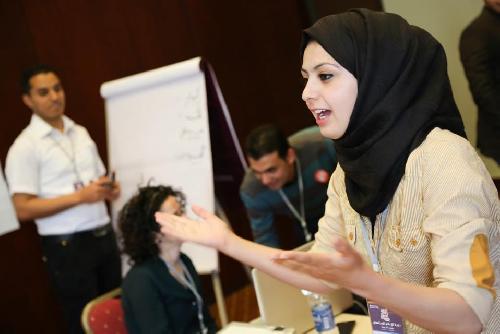“This is the first time that we provide this kind of workshop to a young audience and is actually a first step in Tunisia”reported the two Tunisians experts, Hafedh Bouktif and Ahmed Abdennadher, accredited by the United Nations System Staff College in Human Rights-Based Approach (HRBA) and Results-Based Management (RBM).
Over thirty young women and men, representing 15 Tunisian associations members of the National Advisory Group on Youth, participated in the training workshop organized in Tunis from 20 to 22 February 2015 by the UNESCO Office in Rabat with the support of the European Union. This initiative is part of the NET-MED Youth Project (Networks of Mediterranean Youth 2014-2017), implemented in 10 countries of the Southern Mediterranean region, including Tunisia, which aims to increase youth’s contribution to the development and revision of public policies on youth.
“Since our inspiration is to make change, we learned concepts that we ignored or that we barely knew the existence of. We now have new competences. It boosts morale! declared Rihab Blidi, member of Jeunes Indépendants Démocrates (JID) association. “I would apply the knowledge acquired to my upcoming projects, in my daily work and with other members of the association” said Ghazoua Letaif, member of Sawty association. “Most of the members of our Board are computer engineers; the human right aspect was missing in our mind; from now on, we will have a new approach based on rights and a more effective management tool: the RBM” emphasized Nadhem Ferhi, member of Jeunesse Décide association.
Through simulation exercises, Tunisian case studies and working groups, the participants improved their knowledge and comprehension of the national and international regulatory framework via a Human-Right-Based Approach and the review of policies and programmes focused on the elaboration, revision, operationalization of Youth Public Policies. In this respect, according to Salma Negra, the national project coordinator of NET-MED Youth Tunisia, “the training is intended to serve as a starting point and not as an end result”. UNESCO experts declare themselves available to support and advocate young people through coaching sessions and review of national youth policy in Tunisia in order to intensify the discussions and debates within the three-day training which was, according to young participants, too brief.
For more information about NET-MED Youth in Tunisia, please contact:
Phinith Chanthalangsy, UNESCO Programme Specialist, Social and Human Sciences (p.chanthalangsy(at)unesco.org)
Salma Nagra, NET-MED Youth Coordinator for Tunisia, (s.negra(at)unesco.org)

